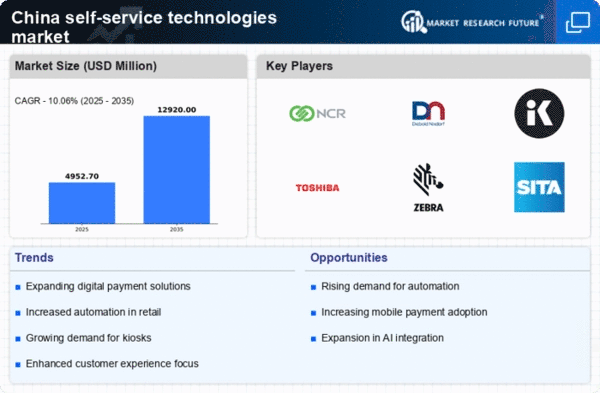Rising Consumer Demand for Convenience
The self service-technologies market in China is experiencing a notable surge in consumer demand for convenience. As urbanization continues to accelerate, individuals seek solutions that streamline their daily activities. This trend is reflected in the increasing deployment of self-service kiosks in retail and food service sectors, which allow customers to place orders and make payments independently. According to recent data, the market is projected to grow at a CAGR of 15% over the next five years, driven by this consumer preference for quick and efficient service. The self service-technologies market is thus adapting to meet these evolving expectations, enhancing user experiences through innovative solutions.
Shift Towards Contactless Transactions
The self service-technologies market is witnessing a significant shift towards contactless transactions in China. With the increasing prevalence of mobile payment systems and digital wallets, consumers are gravitating towards solutions that minimize physical contact. This trend is underscored by a report indicating that over 70% of transactions in urban areas are now conducted via contactless methods. As businesses adapt to this preference, the self service-technologies market is likely to expand its offerings to include more contactless options, thereby enhancing customer satisfaction and operational efficiency.
Growing Focus on Data Security and Privacy
As the self service-technologies market evolves in China, there is an increasing emphasis on data security and privacy. Consumers are becoming more aware of the risks associated with sharing personal information, prompting businesses to prioritize secure self-service solutions. The implementation of advanced encryption technologies and compliance with data protection regulations are becoming essential for market players. This focus on security is likely to foster consumer trust, which is crucial for the sustained growth of the self service-technologies market. Companies that successfully address these concerns may gain a competitive edge in this rapidly changing landscape.
Government Initiatives Supporting Automation
In China, government initiatives aimed at promoting automation and digital transformation are significantly influencing the self service-technologies market. Policies encouraging the adoption of smart technologies in various sectors, including retail and banking, are fostering an environment conducive to growth. The government has allocated substantial funding, estimated at $2 billion, to support research and development in automation technologies. This investment is likely to enhance the capabilities of self-service solutions, making them more accessible and efficient. Consequently, the self service-technologies market is poised to benefit from these supportive measures, leading to increased implementation across multiple sectors.
Technological Advancements in User Interfaces
The self service-technologies market in China is being propelled by rapid advancements in user interface technologies. Innovations such as touchless interfaces, voice recognition, and augmented reality are enhancing the usability of self-service solutions. These technologies not only improve customer engagement but also reduce operational costs for businesses. For instance, the integration of AI-driven chatbots in customer service applications has shown to decrease response times by up to 30%. As these technologies continue to evolve, the self service-technologies market is likely to see a broader adoption of sophisticated interfaces, catering to a tech-savvy consumer base.
















